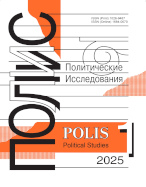Problem of Trust in Scientific Knowledge:
Risks and Ways to Overcome Them
Kravchenko S.A.,
Dr. Sci. (Philos.), Professor, Department of Sociology, MGIMO University; Principal Researcher, Institute of Sociology of FCTAS RAS, Moscow, Russia , sociol7@yandex.ru
elibrary_id: 77019 | RESEARCHER_ID: H-5769-2016
Konnov V.I.,
Dr. Sci. (Philos.), Associate Professor, A.F. Shishkin Department of Philosophy, MGIMO University, v.konnov@inno.mgimo.ru
elibrary_id: 178080 | ORCID: 0000-0001-7292-8850 | RESEARCHER_ID: R-2075-2016
DOI: 10.17976/jpps/2016.05.09
Kravchenko S.A., Konnov V.I. Problem of Trust in Scientific Knowledge: Risks and Ways to Overcome Them. – Polis. Political Studies. 2016. No. 5. https://doi.org/10.17976/jpps/2016.05.09
The article discusses the challenges to trust on behalf of the society, authorities, and science itself towards scientific knowledge that emerged in the process of formation of qualitatively new nonlinear social realities. The authors trace back to the Age of Enlightenment social and cultural factors of almost absolute trust towards scientific knowledge. At the same time, the authors reveal historicity of trust towards “universal” truths and “objective” laws typical of that era. They also analyze relative trust in the form of organized skepticism as well as its role in the emergence of sociology and development of other sciences. In their effort to increase the level of trust towards scientific knowledge, researchers have put forward the demand to include in it the nonlinear critical reflection in relation to the “old” knowledge, which involves repeated rediscovery of novelty in the previously acquired knowledge. The article also determines paradoxes of trust generating unprecedented vulnerabilities of modern life. Special focus is placed on the transition from the “risk society” to the “world risk society” where framed-up risk becomes the norm. The authors show that in today’s complex society virtual reality is playing an increasingly important role, therefore, staged meanings of trust came into our lives. These stage meanings have ambivalent impact on the consciousness and behavior of people, producing both riskophobia and riskophilia. Overcoming the challenges to trust lies within humanistic turn, involving the rejection of neo-liberal vector of development of science, transition to a qualitatively new type of scientific credibility based on the principles of rationality and ethical factors.
See also:
Latov Yu.V.,
Institutional Trust as a Social Capital in Modern Russia (on the Results of Monitoring). – Polis. Political Studies. 2021. No5
Kozyreva P.M., Smirnov A.I.,
Trust in Unstable Russian Society. – Polis. Political Studies. 2019. No5
Satarov G.A.,
Trust as an Object of Political Sociology. Part I. – Polis. Political Studies. 2016. No1
Sergeev V.M.,
On the Deeper Roots of the Modern Financial Crisis. – Polis. Political Studies. 2009. No3
Barsukova S.Yu.,
Enforceable Trust in the World of Social Networks. – Polis. Political Studies. 2001. No2





.jpg)






 print
print
.jpg)
.jpg)